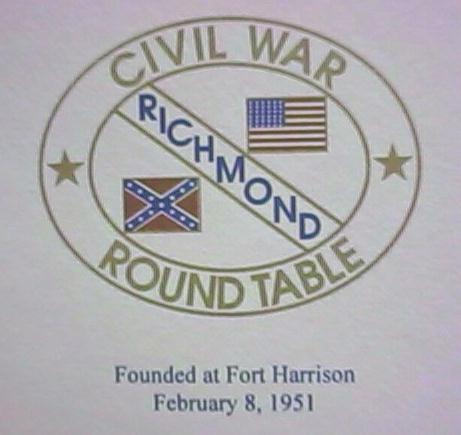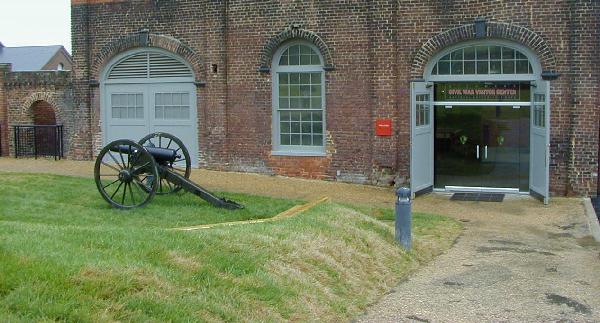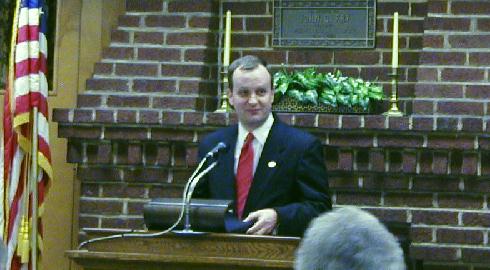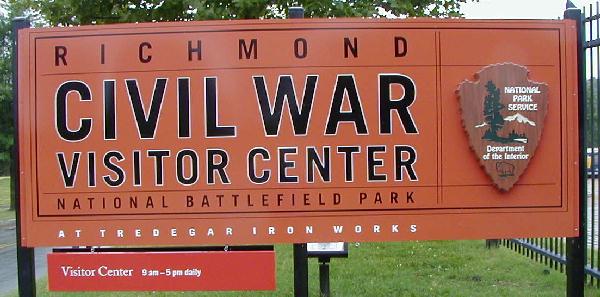


July 2000
R.Danny Witt, President Art & Carol Bergeron, Editors 5500 Ashton Park Way 3901 Paces Ferry Road Glen Allen, VA 23059 Chester, VA 23831-1239 July 2000 PROGRAM Thomas G. Clemens "Will the Real Iron Brigade Please Stand Up!" 8:00 p.m., Tuesday, July 11, 2000 Boulevard United Methodist Church, 321 N. Boulevard, Richmond, VA (corner of Boulevard and Stuart Ave.) Enter basement door from Boulevard side. This talk will offer some new information and challenges many of the commonly held beliefs about the original Iron Brigade. Offering some insight into how historians have overlooked facts or accepted unsubstantiated memoirs for many years, some surprising conclusions will emerge from the dissecting of the story. Please keep an open mind and prepare to be surprised. Tom Clemens received his B.A. (1972) and M.A. (1984) in history from Salisbury State University in Maryland and his C.A.A. (1995) from George Mason University. He is currently working on his doctoral dissertation with Dr. Joseph Harsh of GMU. Tom has been on the faculty of Hagerstown Community College in Hagerstown, Maryland, since 1986. He has published numerous book reviews and articles related to the Civil War; most recently a book review appeared on the Washington Times Civil War page. In 1985 Tom, along with Dennis Frye, John Schildt, and several other people, started Save Historic Antietam Foundation, Inc., a non-profit preservation organization dedicated to preserving and interpreting the sites relating to Lee's Maryland Campaign of 1862. Since 1989, Tom has served as the president of SHAF. In addition to these activities, Tom has been a participant in the volunteer living history programs with several national and state Civil War parks for 22 years. Tom and his wife, Mary Jo, are long time members of the Hagerstown Civil War Round Table. Tom has served in every office of the organization, and Mary Jo is the current Treasurer.
David Johnson
"The Lives of Douglas Southall Freeman" Review of the June Program David Johnson, who serves as counsel to the attorney general of Virginia, presented a fascinating look at the life and writings of one of Richmond's most famous citizens-Douglas Southall Freeman. The presentation came from material that Johnson has been collecting for a full biography which he plans to complete in June of next year. As a youngster, Freeman attended a re-enactment of the Battle of the Crater on the 30th anniversary of that bloody engagement. The old veterans impressed him so much that he vowed to write the history of the Army of Northern Virginia. Freeman's father was a veteran of the 4th Virginia Heavy Artillery, and his stories also had an impact on the future newspaperman, historian, and Pulitzer Prize winning author. A second major influence on Freeman and his writing was the very Southern education he received in Richmond, the former capital of the Confederate States of America. Finally, he was influenced by the older "scientific" approach to history. Freeman actually despised the new "psycho-history" that was becoming prominent at the end of the nineteenth century. Freeman's first foray into the publishing world was A Calendar of Confederate Papers, which appeared in 1908. Seven years later, he edited Lee's Dispatches: Unpublished Letters of General Robert E. Lee, CSA, to Jefferson Davis and the War Department of the Confederate States of America, 1862 to 1865. In 1915, Charles Scribner's Sons contracted with Freeman to produce a biography of Robert E. Lee. He and the editors there sparred over the project for nineteen years, as he expanded it from one to four volumes. When the biography came out in 1934 and 1935, it was hugely successful and won a Pulitzer Prize for its author. Although the study has been the subject of criticism by a number of Civil War historians in the past forty years, it remains the starting place for anyone who wishes to come to grips with the general's life. Between 1942 and 1944, Lee's Lieutenants: A Study in Command was published by Scribner's. This epic study of Lee and his generals quickly became as popular as the biography. One thing that the two works shared was Freeman's "fog of war" technique of writing. He presented his story from the prospective of what the commander of the Army of Northern Virginia and his subordinates knew at the time. The next project Freeman began was a biography of the nation's first president, George Washington. This work appeared in 1948 and received a Pulitzer Prize in 1958. Johnson pointed out that Freeman set up and largely adhered to an extremely rigid schedule so that he could balance his obligations to his family, the Richmond News Leader, his radio broadcasts, and his research. Freeman's day began at 2 a.m. and usually ended before 9 p.m. His wife, Inez, and children were very supportive. A strong conservative, Freeman frequently found fault with Franklin D. Roosevelt's New Deal programs and did not hesitate to criticize them. He was pivotal in the development of Virginia's roadside historical marker program and wrote the text for many of the first signs. Freeman also played an important role in the establishment of the Battle Abbey in Richmond. He died at his home, "Westbourne," in 1953 at the age of 67 and was buried in Hollywood Cemetery.
Richmond Civil War Visitor Center Opens at Tredegar On Saturday, June 17, the Richmond National Battlefield Park's new Visitor Center opened in buildings of the former Tredegar Iron Works next to the James River. Superintendent Cynthia MacLeod welcomed those who attended the ceremonies and introduced the guest speakers for the event. The latter included U. S. Senator Charles S. Robb; Brenton S. Halsey, Chairman of the Riverfront Management Corporation; James E. Rogers, President of the Richmond Historic Riverfront Foundation; Timothy M. Kaine, Mayor of the City of Richmond; and Marie Rust, Regional Director for the Northeast Region, NPS. Robert G. Stanton, Director of the National Park Service made the keynote address. The Fort Lee Military Band provided music for the occasion, and members of Boy Scout Troops 815 of Chester served as the color guard.
 |
Announcements Under New Management. Effective this issue, Art and Carol Bergeron have become editors of the Newsletter. We welcome submissions from the membership relative to special events, tours, seminars, etc., and will consider placing them in the Newsletter. All submissions should be sent to us at least two weeks prior to a regular meeting. Members can use the U. S. Postal Service or e-mail. Our home address appears twice in this issue. For e-mail, send material to: bergero1@ix.netcom.com Performing Arts Program. Pamplin Historical Park & The National Museum of the Civil War Soldier, near Petersburg, will hold a "Civil War Performing Arts Fair" on Saturday, September 16, 2000. This day of fun and music will feature a brass ensemble, a fife and drum band, singers and instrumentalists, and first person impressions of Jefferson Davis and Frederick Douglass. For more information, call Pamplin Historical Park at 861-2408.
*Important Notice* December Meeting The December meeting will be December 12, 2000, at the Holiday Inn-Crossroads, 2000 Staples Mill Road. Social hour will begin at 6 p.m., with dinner following at 7 p.m. The speaker is Ed Bearss who will speak on "The Raising of the Cairo," which will include information about the history of the Union ironclad. The cost for this program is $25.50 per person. Seating is limited, so please get your reservations in early. Send your name, address, and phone number, along with the number of persons for whom you are making reservations to Sam Craghead. Make your check out to the Richmond Civil War Round Table. Sam Craghead 4361D Lakefield Mews Richmond, VA 23231 If you have any questions, call Sam at 222-0503.
Richmond Civil War Round Table Newsletter Art & Carol Bergeron, Editors 3901 Paces Ferry Road Chester, VA 23831-1239
Return to News Letters Index
Return to main page

©R.C.W.R.T. 2000

